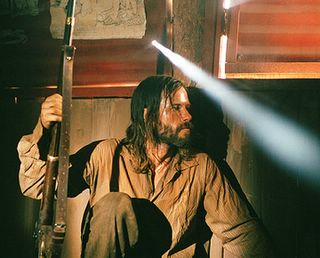The Proposition
British rock icon Nick Cave wrote the script for The Proposition and worked on the soundtrack, and both are heavily inspired by the Robert Altman film McCabe & Mrs. Miller. Like Altman's film, it studies men in a savage environment who nonetheless retain, or attempt to retain, some level of humanity. And like Leonard Cohen's chilling original songs from McCabe, Cave's songs and background music inThe Proposition saturate the film in weary, existential fatigue.
Most Westerns tell stories of heroism and adventure. Some share a nostalgia for an old and forgotten way of life or a code of honor that has lost its relevance in the modern world. Both McCabe and The Proposition look at a dying, crumbling civilization and the sad souls trapped inside with pity. "Can you imagine," they seem to ask, "that only 100 or so years ago, you might have had to live admist all this dirt and grime and hopeless alcohol-soaked despair? Thank God for running water!"
A sharp-featured, lean Guy Pearce stars as Charlie Burns, one third of a gang of outlaw brothers who have terrorized rural Australia near the dawn of the twentieth century. In the film's ripping opening set piece, a determined local lawman, Captain Stanley (Ray Winstone), captures Charlie and his brother Mike (Richard Wilson) in a seige on a brothel. Rather than arrest and try them straight out, Stanley offers Charlie the titular bargain: catch the vicious leader of their gang, brother Arthur (Danny Huston), or else his brother Mike will hang on Christmas Day.
Because that's really all there is to the film's formal narrative, the story resolves itself fairly easily. Charlie finds his brother, there are a few confrontations between brothers as well as Captain Stanley and evil is punished. Cave has pretty much painted himself into a corner here in terms of plotting. The opening scene sets Charlie, Arthur and Stanley on a collision course and we spend the rest of the film slowly working towards the inevitable, which is swift and unsurprising when it finally arrives.
But that doesn't mean there isn't some fun to be had along the way. Director John Hillcoat has really studied his spaghetti westerns. The costumes and set designs are all authentic to the real period in Australian history, but the action retains a strong pulp element and Hillcoat doesn't shy away from blood spray and gore. Little details that heighten the authenticity, from the loving close-ups on the manicured fingernails of Emily Watson (as Captain Stanley's proper British wife) to the shocking blood spray from a flogged prisoner, hearken back to the glory days of the great Sergios if Italian westerns - Leone and Corbucci.
As with those memorable films, The Proposition makes the most of a talented and diverse ensemble of actors. Winstone's really the stand-out here as a man fiercely devoted to justice for all the wrong reasons. So stressed is Captain Stanley, so torn between his love for his wife, his sense of duty and his grim knowledge of what's to come, he barely sleeps, drinks heavily and at times can barely stand. Winstone's tremendously physical in the role, flopping and hurling himself around, as if Captain Stanley were literally carrying the weight of the world on his shoulders.
John Hurt appears in an all-too-brief supporting role as a bounty hunter, and I'm just always happy to see that guy in a movie, and David "Faramir" Wenham provides a suitably loathsome villain with a killer catchphrase. ("What a little piece of filth!")
Unlike the classics of the spaghetti Western genre, The Proposition can get bogged down at times in convention. What initially appears to be a nihilistic takedown of the idea of altruism, with a strong anti-colonial streak, becomes a somewhat more perfunctory examination of good and evil. Cave presents us with some difficult dilemmas as an audience - characters who appear to be interesting and perceptive become psychopaths while others who appear shallow and cruel become sympathetic - but doesn't use this confusion towards any specific end. We're not moved or surprised by discovered misjudgements of character and purpose, just newly invested with altered perceptions.
I can't help but sense, on some level, that this project was approached as an exercize rather than a complete cinema experience. A contemplative, violent throwback Western for which Cave could compose some Leonard Cohen-esque songs. Approached in this manner, as a mainly entertaining oddity, The Proposition is a success. Some fun performances, some nice-looking shots, a whole lot of blood and guts and headless corpses...You know, just old-fashioned entertainment. But it's not exactly McCabe & Mrs. Miller.

No comments:
Post a Comment